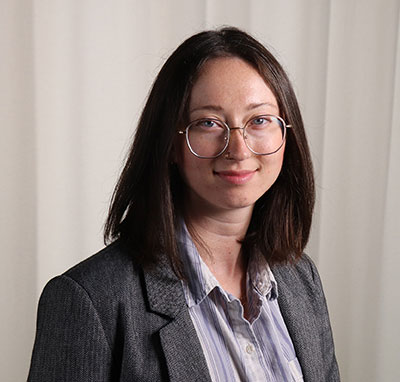New journalism professor Cassandra L.C. Troy examines role of solutions journalism to address environmental issues
 Growing up, Cassandra L.C. Troy was encouraged to be environmentally aware, especially by her grandmother and mother who taught her to care for the planet. But it wasn’t until she worked at a university sustainability office that she considered a career in environmental communications.
Growing up, Cassandra L.C. Troy was encouraged to be environmentally aware, especially by her grandmother and mother who taught her to care for the planet. But it wasn’t until she worked at a university sustainability office that she considered a career in environmental communications.
“In that role, I got a taste of how varied environmental issues are, how complex it is to communicate about different environmental issues,” Troy said. “[What’s] really interesting to me is making that relevant to large portions of the public.”
Troy will be teaching environmental journalism at the College of Media this fall as an assistant professor of journalism with an appointment in the Institute of Communications Research.
She’s excited to connect with students interested in environmental topics and to continue her research on solutions journalism to raise public awareness and engagement on environmental issues.
Troy said solutions journalism takes the approach to reporting that solutions to problems are newsworthy, rather than just the problems themselves.
“In the minds of solutions journalists, in addition to giving the public information on serious complex issues, you also want to talk to them about solutions that are working, or maybe that could work, to address those problems,” she said.
Troy, who is passionate about the impacts of climate change, added that “environmental challenges are so pressing, and they do impact everyone. You don’t have to just be altruistic and really into nature to care about the environment. We all should want to care about clear air or clean water, and what’s happening in the world around us.”
Troy’s position is part of an interdisciplinary faculty “cluster” on climate impacts, risks, and inequality that was approved as part of the Provost Office’s Strategic Hiring Initiative. The other participating units, in the College of Liberal Arts & Sciences, include the Department of Climate, Meteorology & Atmospheric Sciences; Department of Earth Science & Environmental Change; and the Department of Geography & Geographic Information Science.
“Illinois is a place that is committed to research, not just generally, but research related to environmental topics. The institutional commitment to examining climate change from an interdisciplinary perspective is really encouraging,” she said.
Troy earned undergraduate degrees in communication arts and foreign language from Virginia Commonwealth University and initially planned to pursue a career in visual communications and graphic design.
But in her first job after graduation, she was introduced to a broad range of communication work including branding, social media, and content management, which inspired her to get a master’s degree in communication from Purdue University.
During her time in graduate school, Troy loved the research process and realized much of her interest lies behind the why of messaging.
“As I reflected on the direction that I wanted my career to take, I wanted to have the time and space to determine the questions that I wanted to ask, and the time and space to evaluate how different communication strategies were working, which is not always something you have the luxury of doing in a workplace,” Troy said. “You cannot stop and evaluate every single piece of messaging that you put out there and so that is what motivated me to apply to a PhD program versus just continuing in the industry.”
Troy went on to earn a PhD in mass communications from Pennsylvania State University. Her dissertation, “The potential of solutions journalism for climate risk mitigation: A mixed methods investigation,” examined the role of solutions journalism in climate risk mitigation from the perspective of journalists and the general public.
Using both a quantitative and qualitative perspective, Troy studied how to design media messages that support positive results for people and the planet, especially when it comes to climate change. Learn more about Troy’s research.
Through writing about environmental topics in class, Troy’s students will gain an understanding of the unique challenges associated with environmental communication.
“Similar to science journalism, you’ve got the scientifically complex topics and some of the topics are going to be politically polarized. Members of the public might be encountering disinformation or misinformation in relation to these topics and so you have to be really thoughtful in how you cover these issues,” she said.
Helping her students embrace challenges is just one of Troy’s teaching philosophies. She also aims to cultivate curiosity and prepare students for success beyond the classroom.
“My ideal scenario is that everyone can take away at least one thing that’s going to be really valuable when you are given a task in a future professional environment,” she said.
—Kelly Youngblood
